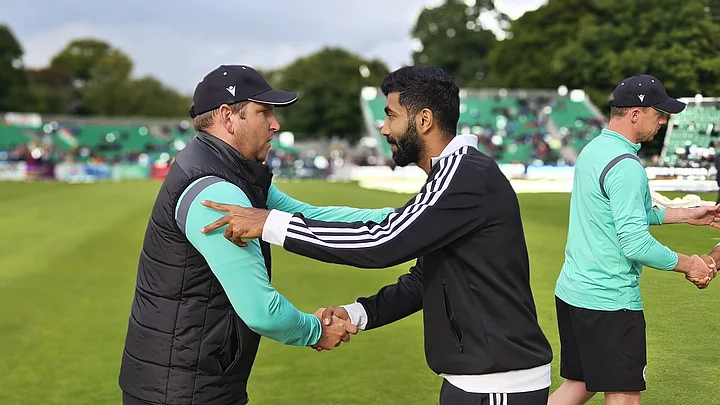The third T20I between India and Ireland was abandoned without a ball bowled due to rain at Malahide, on Wednesday, 23 August. The result also means that India won the three-match series 2-0.
No play was possible at the venue on Wednesday as rain fell steadily, and the capitals did not have to come out for the toss, with no possibility of the match happening, as visuals showed covers firmly over the square area.
With the requirement of the game needing to start by 6.47pm local time for a five overs-a-side contest, an initial inspection by the umpires led to them concluding that they needed to have another one at 5:45pm local time.
As the rain stopped and covers began to be removed, with players coming on the field, there was some hope of the match happening. But with plenty of damp patches on the outfield, no play was a foregone conclusion as Jasprit Bumrah and Paul Stirling shook hands.
With Bumrah collecting the trophy and handing it over to Rinku Singh as the Indian team came together for a group picture, it was quite an ironic scene that the sun came out of clouds after the match was called off.
In the series, India won the first T20I by two runs via DLS method, with Bumrah taking 2-24 in his international comeback. Bumrah would also get the Player of the Match award, to complete a stunning comeback to international cricket after being out for nearly 11 months due to a back injury.
In the second match, Ruturaj Gaikwad anchored India’s innings with a fine fifty while Sanju Samson and Rinku Singh dished out impactful knocks in carrying India to a competitive 185-5, which set the base for them to beat Ireland, who could only make 152-8, by 33 runs.
Crucial Months Ahead for Men in Blue
India’s next international assignment is the 2023 Asia Cup. They will open their campaign against arch-rivals Pakistan on 2 September, before playing Nepal on 4 September. Both of India’s Group A matches will be played at the Pallekele International Cricket Stadium.
The top two sides from Groups A and B will progress to the Super Fours, where they will play three more games at the R. Premadasa Stadium in Colombo, which will also host the final on 17 September.
After the conclusion of the six-team tournament, India will play three ODIs at home against Australia from 22-27 September, before opening their Men’s ODI World Cup campaign, co-incidentally against Australia, on 8 October in Chennai.
(At The Quint, we question everything. Play an active role in shaping our journalism by becoming a member today.)
